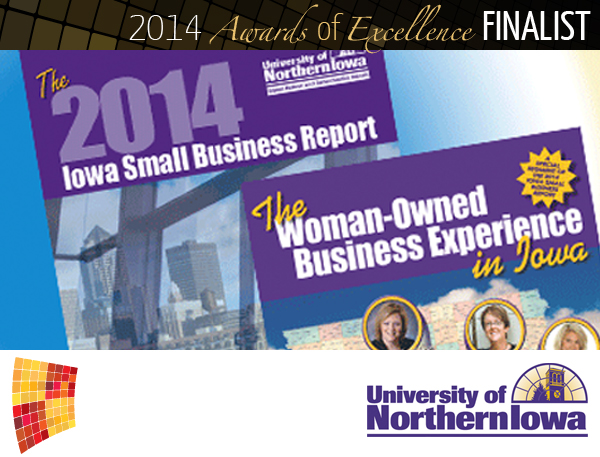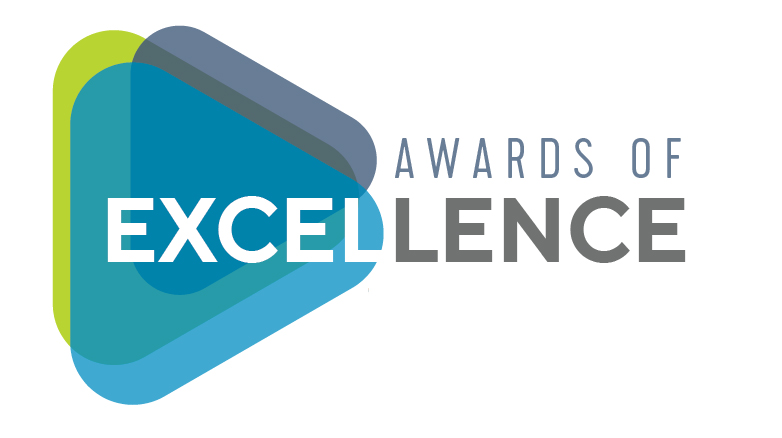Network

| Award Category: | Research and Analysis |
| Project Site: | Iowa Small Business Owner Survey |
| Submitted By: | University of Northern Iowa |
| Contact: | Paul Kinghorn , 319.273.4327 |
Case Study
Abstract
The Iowa Small Business Survey is a transformative research approach dedicated to engaging, understanding and disseminating the needs of small businesses within Iowa to a wide array of partners. This novel and inclusive approach includes three components not typically associated with the act of conducting a survey. First, the survey is collaboratively assembled by a wide group of stakeholders, second, academic researchers and classroom professors are invited to participate and publish using the findings, and last, a traditional survey report is augmented with an innovative and lively ‘magazine’ highlighting the findings and other information about the state ecosystem.
This approach has resulted in new technical assistance programs, academic papers, notable new funding for the university, stronger collaboration between statewide stakeholders, improved government relations between entrepreneurs and elected officials and of particular note, the survey directly facilitated funding for two 2013 UEDA award winning programs: Dream Big Grow Here, and the Business Concierge. The release of the 2014 Iowa Small Business Survey coincides with a statewide movement to address the needs of Iowa women entrepreneurs. Iowa ranks last in the country for growth of women entrepreneurs by number of firms, revenue, and employment. The 2014 survey provided direct feedback from Iowa women-owned business concerning their capital, technical assistance, network and community support needs which will be developed into a plan and funding request at the state and national levels.
Problem/Background
Entrepreneurial development has evolved into an increasingly broader segment of overall economic development activity for most organizations in the past decade. With more than 500,000 new firms launched each and every month and the majority of America’s net new jobs coming from young and small businesses, the importance of understanding the entrepreneur and his or her needs has never been greater. At the same time, identifying, surveying and responding to the needs of these individuals has never been more difficult for public sector practitioners, as the breadth and depth of entrepreneurs is changing rapidly and the entrepreneurial environment can differ greatly from state to state.
In the past, universities and economic development organizations, in their quest to identify and understand entrepreneurs, have relied in part upon the census bureau to provide community and state demographic information about business. While the census is the nation’s best resource for overall information concerning business, it falls short for today’s needs. The most commonly used tables, the Business Dynamics Statistics for example, does not count sole proprietors or unincorporated partnerships. Yet the rate of new business formation by sole proprietors is at its highest level ever; those starts and existing small companies are missed in these traditional tables. Perhaps more importantly, the five year intervals between surveys and the subsequent long wait for the release of findings is not keeping up with the rapid pace of America’s nimble and evolving entrepreneurial sectors.
The best information concerning the needs of these entrepreneurs for such resources as capital, technical assistance, networking, and community support comes from respected organizations, such as the Kauffman Foundation. This information, while of good quality and always timely, does not always measure the nuanced needs of entrepreneurs in specific regions- such as states who may be recovering from natural disasters, or conversely booming from natural gas extraction; both circumstances can reveal specific kinds of entrepreneurial needs. In Iowa for example, American Express Open has ranked the state at the bottom of the country in growth of woman-owned businesses for three years in a row. Only state specific research can hope to get to the bottom of why the rates and growth of woman-owned businesses in the state are so lacking.
Solution
The University of Northern Iowa’s team philosophy is to serve entrepreneurs with a five point approach. We listen to small business owners, imagine what we can do to make life better; then create sharable solutions leveraging our university and technology assets. Annually, we evaluate how we’ve done in terms of economic impact and strive to replicate and scale those programs that are effective.
The UNI team believed an approach could be developed to connect with Iowa’s small business owners, but a traditional survey wasn’t likely to result in the outcomes the team sought. In an age of diminished budgets, a call for greater fiscal accountability and public sector transparency led to a new model of business research that would be collaboratively built, outcome driven, and helpful to as many Iowa stakeholders as possible.
The UNI team developed a transformative research approach in 2012. The method is based upon statewide collaboration to compile research questions, shared data for research, novel dissemination of findings for multiple audiences, and a full feedback loop for entrepreneurs.
Each year, UNI takes a baseline survey template to the statewide Entrepreneurial Roundtable for review and input. The Roundtable, made up of forty or more service provide partners, meets quarterly, offering a forum to share ideas and coordinate efforts around entrepreneurship. The research concept was warmly received in 2012, and each subsequent year input has been provided by members.
Since 2012, particular sections of the survey have become formalized for inclusion in every year’s survey by vote of the group to carry forward information from year to year and offer longitudinal analysis opportunities. These sections include demographic information, key problems facing small business, business growth or decline, technology, and small business use (and evaluation of) approximately 20 resources and services in the state.
Once the survey is complete every year, there is little use for the compiled database of survey results among service provider partners. There is however, considerable value in the data to researchers interested in entrepreneurship. Sharing of this data can lead to new approaches in serving entrepreneurs, better classroom training tools for students, a better understanding of the entrepreneurial mindset, and stronger linkages between universities and public sector programs. The UNI team offered professors with common interests the opportunity to access to the data to conduct research in the classroom and to further their research interests outside of the survey scope. The data sharing component of this approach resulted in on-campus partnerships and two substantial off-campus research projects: a professor at Washington State University and one at Illinois State University looking at mentoring and online and in-person networks, respectively. The 2012 and 2013 surveys were both augmented with short bursts of questions around these two topics.
The full Iowa Small Business Report is compiled by a UNI sister organization called Strategic Marketing Services (SMS). The report is generally more than 150 pages in length and well supported by tables and figures, charts and graphs that summarize the 40 closed and open ended questions from the survey. Given the diverse audiences who might benefit from the findings if the publication were more readable to laypersons, a new magazine format was envisioned to augment the full survey in some cases, and to replace the full report in distribution to others.
In the magazine, the survey is condensed into a graphically imaginative publication augmented with stories of Iowa companies who reflect the four unique kinds of entrepreneurs. The publication showcases many of the comments and direct quotes from respondents concerning critical business issues. Additionally, two dozen short briefs shed specific insight into the entrepreneur experience, and offer suggestions for how public and private sector providers might develop more effective programs, policy and legislation to serve Iowa’s entrepreneurial community.
By its very nature- a survey is not terribly innovative. The Iowa Small Business Survey however, has quite simply, transformed the simple survey process into a 21st century set of resources accessible to a wide array of constituents.
Results
This transformative research approach has yielded some surprising qualitative and quantitative economic development outcomes. The consistent quality of the survey and its findings have positioned UNI as a reputable source for information about the needs of small business, raising the reputation of the university at the statehouse.
Working with the Entrepreneurial Roundtable helps to break down silos among service providers in a substantive way because all at the table can benefit from the collective information captured by UNI. Stakeholders have input to the survey every year, which builds trust and offers the opportunity to work on mutual goals. Multiple providers –some rolling out new resources or wanting to measure the effectiveness of their programs/operations -have asked to be included in the survey in one or more years.
Similarly, the new format for the survey results has increased readership of the survey findings among small business owners and enhanced the reputation of UNI as a champion for their needs. This past year, the index measuring how well small business owners believe the legislature and governor are responsive to their needs jumped by a statistically significant amount.
The Small Business Survey includes several open-ended questions designed to capture information overlooked elsewhere but important for the Entrepreneurial Roundtable and other stakeholders to know. In the first year of the survey, thirty one single-spaced pages of comments from entrepreneurs were recorded, in response to four open-ended questions. Entrepreneurs were clearly eager to have their voices heard. As a result of this response, a new website called Speak Out Small Business was launched, providing incentivized blogging opportunities for small business owners in Iowa. In addition, the survey magazine is now being distributed electronically to all business owners in the sample pool, whether they participated in the survey or not, insuring a full circle of information capture and response.
In 2012, after documenting a gap for services among mid-sized Iowa companies for technical assistance associated with growth strategies from the survey, UNI was able to propose to the Iowa Legislature an Iowa economic gardening program called Advance Iowa. The project received a $500,000 annual appropriation to build out the program based upon the strong combination of documented need, and a nationally popular service delivery strategy.
UNI has multiple, existing programs too, that have received support and funding as a result of the Iowa Small Business survey- most notable among them the highly popular Dream Big Grow Here and the Business Concierge initiatives. Both programs were born as a result of survey findings.
Two papers, resulting from research conducted by Dr. Tera Galloway, Illinois State University and Dr. Kristine Kuhn of Washington State University based upon the Iowa survey data concerning networks and mentoring were accepted into the Babson College Entrepreneurship Research Conference in June 2014. This expanded research offered new insights into how entrepreneurs form networks, seek advice, and choose mentors. It could not have been possible without access to the UNI data from 2012.
The most exciting outcomes are yet to come. For the past two years, the state of Iowa has been ranked last in the country by American Express Open in growth of woman-owned businesses. These findings have galvanized champions across the state in support of new programs and services to support woman-owned businesses. But what to do? The results of the 2013 survey released in May provided a group of collaborative partners direct feedback from woman-owned businesses in Iowa concerning their needs and business experience. These findings are the basis around which a comprehensive plan is being developed to secure funding and other resources to better serve women in Iowa.
Future Considerations
This approach is readily replicable among large and small institutions nationwide. The basic approach is simple and based in the four key elements: statewide collaboration, research, innovative dissemination, and feedback loops to entrepreneurs. The survey tools are common to all states and those services can be solicited from public and private sector vendors.
While not required, we would like to note that the initial survey was funded in part through an earmark from SBA and was envisioned as a single year study. The approach was so successful however, the findings were presented to the Iowa legislature a few months later and an additional request for funding was approved. The project has been met with favorable and continued funding since then.
Finalist Presentation
UEDA Awards of Excellence Finalists presented at the Annual Summit in Santa Fe on September 29-30, 2014. Summit attendees then voted for the best initiative in each category.

